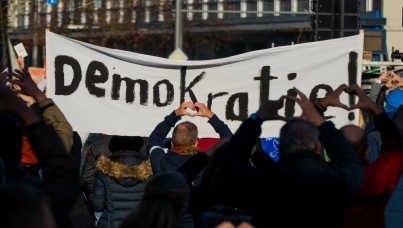Global attitudes toward gender in 2020
Trait association
 Nearly two in three Russians associate “strength” with males more so than “females.
Nearly two in three Russians associate “strength” with males more so than “females.
China and Turkey are most likely to associate wisdom more with males than females.
Three in ten people in China think that humor is more of a masculine trait than feminine.
The lowest across all countries surveyed, only 1% of Serbians think of caring for others as a more masculine than feminine trait.
One third of those in China, India and Saudi Arabia associate confidence more with males than females.
Almost half of people in China associate leadership with males more than females.
Task association
In Saudi Arabia, 35% of people say paying bills and managing finances tends to be performed by males, while another 20% says it tends to be performed by females.
![To what extent would you say that each of taking care of children tends to be performed more by females or by males in [country] households? | Global Advisor | Ipsos](/sites/default/files/ct/news_and_polls/2024-11/man-carrying-his-baby.jpg) A majority of Russian people think that caring for children is performed more by females than males.
A majority of Russian people think that caring for children is performed more by females than males.
On average, Chinese are the most likely to believe that home maintenance and repairs are performed more by males than females.
Half of Serbians think cooking is performed more by females, while only 1% think it is performed more by males.
More than half of Russian and Serbian people think that cleaning is performed more by females than males.
In Serbia, nearly 7 in 10 say laundry is performed more by females.
Job association
In Japan, India, and Saudi Arabia, more than a quarter of people say that doctors are more likely to be male than female.
In Russia, half of people think teachers are more often females than males.
On average, people are more likely to think politicians are usually males than females. This is especially prominent in Russia, where more than half agree with this.
![To what extent would you say each of scientist tends to be held more by females or by males in [COUNTRY]? | Global Advisor | Ipsos](/sites/default/files/inline-images/man-women-scientits.jpg) In France, people are less likely than the global average to think scientists are more often males, with only 9% in France compared to 21% globally.
In France, people are less likely than the global average to think scientists are more often males, with only 9% in France compared to 21% globally.
In Russia, 68% of people say information technology workers are more male than female, forty percentage points higher than the 28% seen globally.
The mean for Serbian people is 9, indicating that on average, Serbian people think construction work is nearly only performed by males.
Future predictions
India is the most likely (47%) to think that characteristics, household tasks and occupations will be associated more with one gender over in five years. South Korea is most likely to think the opposite: almost half (49%) believe that they will be associated less with one gender over another in five years.
The results anchor a new report from Ipsos that delves into the global public opinion about the future of gender. In it, Ipsos asks more than 20,000 people in 29 countries about how gendered they think certain characteristics, household tasks and occupations are. Then it asks whether people think their country will be more or less gendered in the future.
The report, the latest in Ipsos’ award-winning What the Future series, also looks at masculinity, representations of women in the media, and the gendered marketing of products from toys to fashion. The full report can be viewed at future.ipsos.com/what-the-future.



